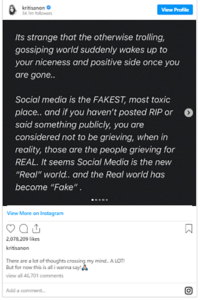Websites are devoted to scandalous anonymous gossip on celebrities, and the issue’s back in the spotlight with Sushant Singh Rajput’s death
“High society has been treated to a sorry spectacle of inebriety during the last two weeks at balls and dinners, and I am glad to say that this shocking example, though unfortunately a woman, is not an American, but a specimen of British aristocracy…”
Over 100 years ago, a Civil War veteran in the United States, William d’Alton Mann, was given charge of a magazine called Town Topics. What was once a “genteel periodical” soon blossomed into a scandal sheet. Mann had everyone, from housemaids to socialites, on his payroll, gathering juicy gossip on America’s rich and famous. He wasn’t averse to a little blackmail either.
Mann was something of a pioneer in this form of “journalism”, frequently seen on reports on celebrities and films. You’ve seen it in magazines and blogs, whether you’ve gone looking for it or not. “This well-known actress was spot wining and dining with a Bollywood superstar whose son is now debuting in a movie this year”, or “Did this twinkle-toed actor get up to no good at a recent Diwali party at a famous producer’s house?”
Called a “blind item”, it’s a snippet, usually replete with gossip and scandal, where identities aren’t revealed, but it’s still fairly obvious who the piece is talking about. Bollywood is no stranger to it. While blind items have been criticised time and again, they’ve returned to the spotlight with the recent death of Bollywood actor Sushant Singh Rajput.
Rajput, 34, was found dead in his Carter Road apartment in Mumbai on June 14. The Mumbai police suspected suicide, and an investigation is ongoing. What followed was, to put it bluntly, a spectacle, which included fingers being pointed at how blind items were used to “tarnish” Rajput’s image, or to label him as an “outsider”.
One thing must be made clear, though. Rajput did not leave a suicide note; any conversations that blamed blind items for his death are completely speculative with absolutely no basis in fact. It’s simply yet another shade of an ugly industry that’s already ravaged with accusations of nepotism.
Guessing games at Pinkvilla
Three days after Rajput’s death, actor Kriti Sanon put up an Instagram post saying blind items need to be banned.
At this time, leading Bollywood celebrities, like Karan Johar, Salman Khan and Alia Bhatt, were being criticised on social media for nepotism. Twitter users dug up old episodes of Koffee with Karan and — inexplicably — used them to claim that Bollywood’s star kids were dismissive of Rajput and, therefore, responsible for his death. Kangana Ranaut, who is also a Bollywood “outsider”, shoved her oar in and brought up blind items while bafflingly calling Rajput’s death a “planned murder”.

What is true, however, is that Rajput was seemingly target of blind items over the years. The websites include Pinkvilla, One Shot One Place, and the Opinionated Indian. Industry employees told Newslaundry that blind items are sometimes even used as a form of currency in Bollywood — to “tarnish” images and spread rumours.
A fortnight before Rajput died, Pinkvilla wrote a piece headlined: “Guess Who: This actor has been asked to vacate his apartment after neighbours complain of his lifestyle.” The “guess who” is an ubiquitous format for a blind item, providing all the details surrounding the subject’s identity except for their name.
Those following Bollywood gossip very quickly identified Rajput as the subject of the piece, which claimed his “terrible mood swings and arrogance cost him a few projects”, and that he had now been asked to vacate his apartment after “lavish parties” thrown by “high-handed friends” with “drinks [and] other vices”. Neighbours “complained to the society several times” and then “gave the actor an ultimatum”.
Unsurprisingly, the insinuations are untrue, if Rajput was indeed the subject of this “report”.
For example, Newslaundry contacted Abhishek Trimukhe, the Deputy commissioner of the Mumbai police, Zone 9, who is monitoring the investigation into Rajput’s death. Had he heard about Rajput’s “out of control” parties and neighbours’ complaints?
“Nothing of such sort has come to our observation in our investigation,” Trimukhe said. “We have spoken to many people about him and everybody told us that he was an excellent guy. He was soft-spoken, intelligent, and a good person to interact with. Everybody to whom we spoke said he was a great guy.”
Bhagwan Kamble, a resident of Carter Road, told Newslaundry that Rajput had been “approachable, humble and soft-spoken”. “I met him a few times at Joggers’ Park. If someone said hi to him, he would always respond and interact in a nice way,” Kamble said. “He didn’t have any airs about himself.”
According to Kamble, Mont Blanc, the society where Rajput lived, is a “peaceful society”. “We have never heard of any misbehaviour by him, ever.”

Pinkvilla: ‘We are a very reputed website’
Rajput was guessed to be the subject of other blind items on Pinkvilla. In October 2018, yet another “guess who” asked if a certain actor’s “philandering ways” may land him in jail. The article urged readers to guess the subject and name him in the comments — and several complied.
In January 2018, Pinkvilla wrote about a “young actor who is known for his acting chops” who was not signed onto a project because he’s “perpetually high”. The “clues” here were references to the actor’s “social media gyaan” and that he was in talks with a “reputed National Award winning director” for an upcoming film.
In February 2018, Pinkvilla coyly claimed that an actress was “tolerating physical abuse” from an actor because she was “madly in love”. This piece’s comment section was divided, but several concluded that Rajput was the actor in question.
Speculation and gossip isn’t new to the world of cinema, but it doesn’t give websites a free pass either.
Pinkvilla was founded in 2007 by Nandini Shenoy, who formerly worked at Microsoft. Shenoy is its managing director. The other two directors are Mukul Kumar Sharma and Jeu George.
Newslaundry contacted Shenoy and Sharma to ask about the blind items on Pinkvilla that were guessed to be about Sushant Singh Rajput, but they did not respond. This piece will be updated if a response is received.
Newslaundry also contacted a content writer and reporter with Pinkvilla to ask about unverified blind items on Pinkvilla that are purportedly about Rajput.
The reporter said, “To be very frank, I don’t know about it. It’s not like we are the only ones who write. There are others as well. I am genuinely saying that I don’t have any idea about it and I don’t know who wrote it.”
But is it appropriate to write blind items in the first place without verifying facts?
“You must have fact-checked the article from your side, but whoever wrote that article must have also verified the facts,” said the reporter. “To be honest, the reality of every person is different. We cover Bollywood on a daily basis, so we probably know a little more. Sometimes what happens is that many things don’t come out, and you know how this industry works…In the entertainment sector at least, we are a very reputed website, so it’s not like we post anything or everything.”
The business of blind items
The website One Shot One Place is devoted to blind items, with special sections for “blind items solved” and the “dissection” of gossip.
Days before Rajput’s death, for example, the website listed a blind item from Mumbai Mirror on how an actor and a director had “ruined” a project “with their alleged misbehaviour”. The website “guessed” that the actor in question was Rajput. Other items refer to Rajput as well, though several were deleted after his death.
The Opinionated Indian, a website that specialises in “blind items, celebrity gossip, entertainment news”, had “guessed” Rajput to be the subject of several blind items in other publications too. Allegations included accusing the subject of stalking, being unfaithful, physical abuse, and drug abuse.
Karthik Murthy, who runs the Opinionated Indian, said the blind items in his site are based on information provided by employees of PR agencies and talent agencies, and friends from the industry. He emphasised that he has “never published anything about Sushant on my own”; his stories are picked up from reputed media houses like DNA and the Times Group.
“I mention in my articles that these are based solely on rumours and readers are supposed to use their discretion,” Murthy said.
He added: “But I would like to mention that blind items do serve a purpose, and are not only for entertainment. They inform small-towners in Uttar Pradesh, Bihar and Gujarat, who plan to leave their homes to become superstars like Amitabh Bachchan and Shahrukh Khan, of the realities of the industry. If they read our blogs, they know the reality: that it’s not as easy or simple as it sounds. They come to know of the struggles and things behind the scenes that they may not be aware of.”
Murthy said he’s also heard of celebrities “planting” blind items to target other celebrities, though he hasn’t come across it himself. “But in the wake of Sushant’s death, I have decided that we should verify blind items before publishing them. I will not republish any blind item without verifying the facts, irrespective of it being published in a reputed newspaper.”
A Bollywood director, on the condition of anonymity, said that PR and talent agencies that manage filmstars and other artists play a “major role in planting blind items”.
“For instance, a newspaper published a blind item in the past on Sushant throwing a bottle at a director at a party. That was fake news,” the director said. “They try to tarnish the image of artists through blind items. Unfortunately, people start to believe them.”
Rajput was a good actor and dancer, and made people insecure, the director claimed. “He was an outsider and did not massage the egos of others. That’s why he was targeted,” the director said. “A systematic smear campaign was run against him. For instance, Chhichhore was a superhit movie but it was projected as an average film.”
An employee with a PR firm that handles movies said blind items have “one to two percent truth” so they aren’t “completely false though the amount of truth is less”.
“Rival groups do plant stories against each other. During the #MeToo movement, many people in the industry planted stories against each other,” the employee said. “The thing with a blind item is you can’t even question it, because by questioning it, you’re admitting that it’s about you.”
It’s called ‘blind’ for a reason
Rajeev Masand, a film critic of repute, made blind items popular in his column in Open magazine. Several of his pieces have been picked up and discussed by gossip websites and blogs. Masand was criticised on social media after Rajput’s death, with claims that he referred to Rajput as “overpaid”, involved in the #MeToo controversy, and being a “skirt-chaser” in his blind items.
When Newslaundry contacted Masand to ask him about his writings on Rajput, he said: “I don’t really want to speak about it. There is just too much going on and I just don’t want to talk about it.”
Mayank Shekhar, a senior journalist and film critic, said that writing “moralistic” blind items, gossiping on the personal lives of celebrities and how they’re “so screwed up”, is “cowardly”.
“What kind of a person would like to indulge in something like this for a profession?” he asked. “Now, as with stories in general, there are sources who surely have their own motives behind passing on information of any sort. Not all such motives may be noble. I’m pretty sure blind items don’t work differently.”
Are paid “blind items” prevalent in India’s film industry? “Honestly, it would be news to me as well. Is the practice of paid items in general prevalent though? Totally. It’s the killing of ethical film journalism that the film industry has been wholly complicit in,” Shekhar said.
How would Shekhar assess the blind items on Rajput?
“Nasty. Deeply irresponsible. Shameless, pretty much,” he said. “While I had met him a few times, my own perception of him was based so much on stuff that some people/publications continuously wrote about him. Would it have had an effect on him? Doubtlessly, yes. Imagine walking into a room knowing that people have read that third-rate gossip — called ‘blind’ for a reason — about you. Would you not be affected by it? Can you take legal recourse, or even deny it in public? No, because they never named you, and the denial becomes then an admission of guilt. It’s sad. God knows we’ve all been complicit — both journalists and readers — in carrying in on with this cheapness and salaciousness.”
He added: “Rajput regularly featured in this high-brow literature — often made out to be a wannabe, sex-crazy drunk. It’s hard enough to make it as an outsider. Look at that six-pack/stamina, besides the healthy body of work. I’d want to be that drunk.”
Filmmaker Apurva Asrani said: “There was a term used when I was growing up: ‘yellow journalism’. The new word for it is ‘blind item’ where, without naming the ‘target’, without taking a byline, a writer is able to damage or further the career of an individual. I say writer and not journalist, because I believe this is cowardly writing, often used in vicious smear campaigns.”
Asrani himself was the subject of blind items in the mid-2000s that caused people to believe he didn’t live in the country, “costing me good work”, he said.
“But the media doesn’t care about editors or writers, so let’s keep the focus on stars. In Sushant’s case, there were some vicious blind articles written on him that he simply couldn’t fight,” Asrani pointed out. “The writers of these people are powerful media people, and most are often co-opted by filmmakers who have scores to settle with these actors. I think if a journalist has verified their story, and can stand by their words, only then should anything appear in print. With a byline.”
Viral Bhayani, a Bollywood and fashion photographer, claimed there aren’t many blind items in Bollywood, “only a few websites”. “These days, everything is harmful. That’s why I exercise extreme care while releasing my photos, because it’s possible it may offend someone…It’s important these days to write things based on facts.”
A renowned film critic in the Hindi film industry agreed that blind items are often used to “purposefully damage” the images of some artistes, and are sometimes “misused”. “But we cannot deny the fact that blind items have been there since time immemorial,” he added.
Cybersecurity expert Ajit Hatti said gossip sites are a place where people “satisfy their cravings to name-call and pass comments on others without worrying about being caught or pulled aside”. “Such sites are also a popular medium to relieve grudges against peers,” he said. “The comments there are neither confirmative nor indicative in case of any investigation. They are designed in a way that one can get away after posting unverified things.”
www.newslaundry.com
(Cover: “Blind item” are snippets, usually replete with gossip and scandal, which without revealing identities make it very obvious about the subject of the article // Photo: Newslaundry)




